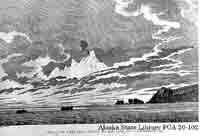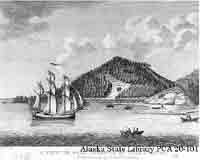
 |
|
||||||||||||||||||||||||
|
Russia's Colony
The English - and Captain Cook - Step In
England was Russia's other serious in the North Pacific. In the last half of the 18th century the English were the world's most formidable sea power. The British Admiralty (the Royal Navy) sent seven expeditions around the world. By far England's most accomplished navigator was Captain James Cook, who circumnavigated the globe twice. Cook found and mapped many Pacific islands, including Hawaii. He learned how to treat scurvy, even though he did not know what caused it. He tested the first clock that would keep working during a long sea voyage, thereby making it possible for mariners to compute longitude - the distance they were east and west from land. Link:
In 1776 the Admiralty called Cook out of retirement and sent him on a third voyage, this time to the Pacific Northwest Coast. He was directed to find the Northwest Passage, a water route through North America, that geographers hoped would provide an alternative to sailing around South America to get from the Atlantic to the Pacific oceans. Searches on the Atlantic side of the continent had found no such route, so Cook was sent to look along the Pacific coast. Links:
Cook provided the first charts of the North American coastline from California to the Arctic, a remarkable achievement. At last everyone knew the shape of North America.  Cook Inlet volcano from Port Graham, 1789 Collection Name: Alaska Historical Library, Alaska Centennial Collection. The Natives of Cook Inlet, the Dene Athabaskan people, traded fur pelts with Cook's crews for knives and needles. Cook sent a boat to the shore where one of his lieutenants buried an earthen bottle with parchment inside, claiming all of the land drained by the waters of Cook Inlet for England. The bottle has never been found.  Port Graham, Cook Inlet, 1789 Collection Name: Alaska Historical Library, Alaska Centennial Collection.
|
|||||||||||||||||
|